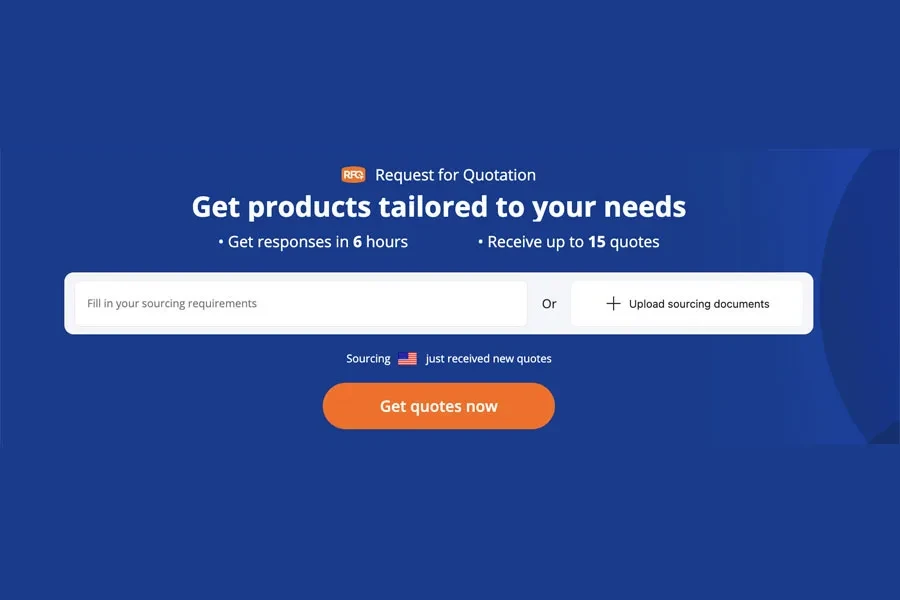In the fiercely competitive landscape of commerce, new brands can easily founder in their search for reliable suppliers who can bring their visions to life. Luckily, platforms like Alibaba.com understand these obstacles and have become an invaluable resource in connecting businesses with suppliers worldwide. As a new brand, shopping around for suppliers is both beneficial and imperative for laying a sturdy foundation for their goals and ensuring the quality of their products.
However, this can prove challenging for anyone just starting out or lacks experience in sourcing and negotiation. With this guide, we hope to detail how new brands can get their foot in the door of e-commerce and utilize the tools that are disposable to them at Alibaba.com, specifically the all-in-one quotation tool, Request for Quotation (RFQ).
Table of Contents
Why it’s important for new brands to shop around for suppliers
What are the key benefits of Request for Quotation?
How new brands can use and post an RFQ on Alibaba.com
Tips on how new brands can optimize their RFQ search
Conclusion
Why it’s important for new brands to shop around for suppliers

New brands need to explore their options to ensure they find suppliers who align with their values, quality standards, and budget constraints. By comparing multiple suppliers, they can make informed decisions, mitigate risks, and forge long-term partnerships that foster growth and innovation.
This is especially important for newly launched brands as they may have more requirements regarding finding trustworthy original equipment manufacturers (OEM) for customized products compared to veteran companies.
And, as any established brand will know, pinpointing suitable suppliers involves more than just a simple Google search; it requires strategic planning and thorough research, which in turn benefit from following a few key steps:
- Define your requirements: Before diving into supplier searches, you must have a clear understanding of their product requirements. This includes specifications such as materials, quality standards, manufacturing capabilities, and any specific certifications needed.
- Network within your industry: Engage with industry peers, attend trade shows, and participate in relevant forums or online communities. Networking within the industry can provide valuable insights and recommendations for reputable suppliers.
- Utilize online platforms: Online e-commerce platforms like Alibaba.com offer an extensive database of suppliers. In-built advanced search filters, as well as user reviews will help you first narrow down the options.
- Conduct background checks: Once you’ve identified potential suppliers, conduct thorough background checks. Evaluate their reputation, years of experience, client portfolio, and any certifications or compliance standards they adhere to.
- Request samples: Make sure to request samples from shortlisted suppliers before committing to large-scale production. This allows you to assess product quality, consistency, and compatibility with your brand standards.
- Assess scalability and flexibility: Consider suppliers’ scalability and flexibility to accommodate future growth or changes in product demand. Partnerships with agile suppliers who can adapt to evolving needs are advantageous for new brands.
By diligently following these steps, new brands can pinpoint suitable suppliers who not only meet their immediate needs but also possess the potential to grow and evolve alongside the brand. Investing time and effort in supplier selection lays the groundwork for long-term success and sustainability in the competitive marketplace.
What are the key benefits of Request for Quotation?

Now that you have a better idea of what to look for, it’s time to narrow down your options as efficiently as possible. That’s where Request for Quotation (RFQ) on Alibaba.com comes in, empowering buyers like you to streamline the sourcing process.
Via a simple online form, you can connect with multiple suppliers simultaneously, specifying your product requirements and desired quantities. The benefits of RFQ are manifold, including:
- Efficiency: RFQ eliminates the need for individual inquiries, saving time and effort.
- Customization: You can tailor your requests to suit your unique needs so as to create bespoke products.
- Competitive pricing: By soliciting quotes from different suppliers, you can compare prices and negotiate favorable terms.
- Quality assurance: RFQ enables you to assess a supplier’s capabilities and certifications before making a commitment.
How new brands can use and post an RFQ on Alibaba.com
Using the RFQ feature on Alibaba.com is straightforward and the same for both new and veteran brands. Simply navigate to the RFQ page and fill out the required fields detailing your product specifications, quantity, and any other pertinent information, making sure to be clear and concise in your communication to ensure accurate responses from suppliers.
Once submitted, sit back and await proposals from potential suppliers eager to fulfill your requirements: On average, buyers receive up to 15 quotes in as little as six hours from over 200,000 qualified suppliers across 200 million-plus products.
Tips on how new brands can optimize their RFQ search

To maximize the effectiveness of requests, new brands should:
- Provide detailed specifications: Clearly outline your product requirements, including dimensions, materials, and desired features.
- Set realistic expectations: Be transparent about your budget, timeline, and quality standards to attract suitable suppliers.
- Research and vet suppliers: Prioritize reputable suppliers with positive reviews and relevant experience in your industry, taking specific note of Verified Suppliers who have a proven track record of providing products to spec.
- Communicate effectively: Promptly respond to supplier inquiries and provide clarifications to ensure mutual understanding.
- Negotiate wisely: Use RFQ responses as leverage to negotiate competitive pricing and favorable terms that align with your business objectives.
Conclusion
In the journey of building a new brand, sourcing the right products is paramount. Alibaba.com’s Request for Quotation feature empowers new brands to navigate the complex landscape of supplier selection with ease and confidence. By leveraging RFQs effectively, you gain access to a vast network of suppliers, streamline your sourcing process, and pave the way for success in a competitive market.
For more tips on how to get your business off the ground and thriving, make sure to subscribe to Alibaba.com Reads.



